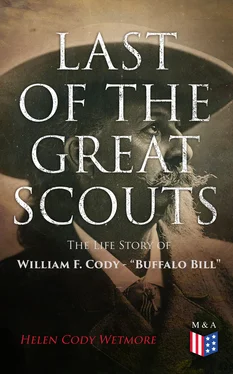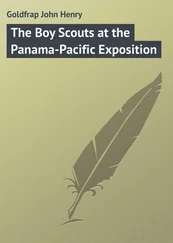From our leafy covert we could see the panther's tawny form come gliding through the brush. He saw Turk, and crouched for a spring. This came as an arrow, but Turk dodged it; and then, with a scream such as I never heard from dog before or since, our defender hurled himself upon the foe.
Turk was powerful, and his courage was flawless, but he was no match for the panther. In a few moments the faithful dog lay stunned and bleeding from one stroke of the forest-rover's steel-shod paw. The cruel beast had scented other prey, and dismissing Turk, he paced to and fro, seeking to locate us. We scarcely dared to breathe, and every throb of our frightened little hearts was a prayer that Will would come to us in time.
At last the panther's roving eyes rested upon our inadequate hiding-place, and as he crouched for the deadly leap we hid our faces.
But Turk had arisen. Wounded as he was, he yet made one last heroic effort to save us by again directing the panther's attention to himself.
The helpless, hopeless ordeal of agony was broken by a rifle's sharp report. The panther fell, shot through the heart, and out from the screen of leaves rushed two hysterical little girls, with pallid faces drowned in tears, who clung about a brother's neck and were shielded in his arms.
Will, himself but a child, caressed and soothed us in a most paternal fashion; and when the stone of sobs was passed we turned to Turk. Happily his injuries were not fatal, and he whined feebly when his master reached him.
"Bravo! Good dog!" cried Will. "You saved them, Turk! You saved them!" And kneeling beside our faithful friend, he put his arms about the shaggy neck.
Dear old Turk! If there be a land beyond the sky for such as thou, may the snuggest corner and best of bones be thy reward!
CHAPTER III. — THE SHADOW OF PARTISAN STRIFE.
Table of Contents
OWING to the conditions, already spoken of, under which Kansas was settled, all classes were represented in its population. Honest, thrifty farmers and well-to-do traders leavened a lump of shiftless ne'er-do-wells, lawless adventurers, and vagabonds of all sorts and conditions. If father at times questioned the wisdom of coming to this new and untried land, he kept his own counsel, and set a brave face against the future.
He had been prominent in political circles in Iowa, and had filled positions of public trust; but he had no wish to become involved in the partisan strife that raged in Kansas. He was a Free Soil man, and there were but two others in that section who did not believe in slavery. For a year he kept his political views to himself; but it became rumored about that he was an able public speaker, and the pro-slavery men naturally ascribed to him the same opinions as those held by his brother Elijah, a pronounced pro-slavery man; so they regarded father as a promising leader in their cause. He had avoided the issue, and had skillfully contrived to escape declaring for one side or the other, but on the scroll of his destiny it was written that he should be one of the first victims offered on the sacrificial altar of the struggle for human liberty.
The post-trader's was a popular rendezvous for all the settlers round. It was a day in the summer of '55 that father visited the store, accompanied, as usual, by Will and Turk. Among the crowd, which was noisy and excited, he noted a number of desperadoes in the pro-slavery faction, and noted, too, that Uncle Elijah and our two Free Soil neighbors, Mr. Hathaway and Mr. Lawrence, were present.
Father's appearance was greeted by a clamor for a speech. To speak before that audience was to take his life in his hands; yet in spite of his excuses he was forced to the chair.
It was written! There was no escape! Father walked steadily to the dry-goods box which served as a rostrum. As he passed Mr. Hathaway, the good old man plucked him by the sleeve and begged him to serve out platitudes to the crowd, and to screen his real sentiments.
But father was not a man that dealt in platitudes.
"Friends," said he, quietly, as he faced his audience and drew himself to his full height—"friends, you are mistaken in your man. I am sorry to disappoint you. I have no wish to quarrel with you. But you have forced me to speak, and I can do no less than declare my real convictions. I am, and always have been, opposed to slavery. It is an institution that not only degrades the slave, but brutalizes the slave-holder, and I pledge you my word that I shall use my best endeavors—yes, that I shall lay down my life, if need be—to keep this curse from finding lodgment upon Kansas soil. It is enough that the fairest portions of our land are already infected with this blight. May it spread no farther. All my energy and my ability shall swell the effort to bring in Kansas as a Free Soil state."
Up to this point the crowd had been so dumfounded by his temerity that they kept an astonished silence. Now the storm broke. The rumble of angry voices swelled into a roar of fury. An angry mob surrounded the speaker. Several desperadoes leaped forward with deadly intent, and one, Charles Dunn by name, drove his knife to the hilt into the body of the brave man who dared thus openly to avow his principles.
As father fell, Will sprang to him, and turning to the murderous assailant, cried out in boyhood's fury:
"You have killed my father! When I'm a man I'll kill you!"
The crowd slunk away, believing father dead. The deed appalled them; they were not yet hardened to the lawlessness that was so soon to put the state to blush.
Mr. Hathaway and Will then carried father to a hiding-place in the long grass by the wayside. The crowd dispersed so slowly that dusk came on before the coast was clear. At length, supported by Will, father dragged his way homeward, marking his tortured progress with a trail of blood.
This path was afterward referred to in the early history of Kansas as "The Cody Bloody Trail."
It was such wild scenes as these that left their impress on the youth and fashioned the Cody of later years—cool in emergency, fertile in resource, swift in decision, dashing and intrepid when the time for action came.
Our troubles were but begun. Father's convalescence was long and tedious; he never recovered fully. His enemies believed him dead, and for a while we kept the secret guarded; but as soon as he was able to be about persecution began.
About a month after the tragedy at Rively's, Will ran in one evening with the warning that a band of horsemen were approaching. Suspecting trouble, mother put some of her own clothes about father, gave him a pail, and bade him hide in the cornfield. He walked boldly from the house, and sheltered by the gathering dusk, succeeded in passing the horsemen unchallenged. The latter rode up to the house and dismounted.
"Where's Cody?" asked the leader. He was informed that father was not at home.
"Lucky for him!" was the frankly brutal rejoinder. "We'll make sure work of the killing next time."
Disappointed in their main intention, the marauders revenged themselves in their own peculiar way by looting the house of every article that took their fancy; then they sat down with the announced purpose of waiting the return of their prospective victim.
Fearing the effect of the night air upon father, though it was yet summer, mother made a sign to Will, who slipped from the room, and guided by Turk, carried blankets to the cornfield, returning before his absence had been remarked. The ruffians soon tired of waiting, and rode away, after warning mother of the brave deed they purposed to perform. Father came in for the night, returning to his covert with the dawn.
In expectation of some such raid, we had secreted a good stock of provisions; but as soon as the day was up Will was dispatched to Rively's store to reconnoiter, under pretext of buying groceries. Keeping eyes and ears open, he learned that father's enemies were on the watch for him; so the cornfield must remain his screen. After several days, the exposure and anxiety told on his strength. He decided to leave home and go to Fort Leavenworth, four miles distant. When night fell he returned to the house, packed a few needed articles, and bade us farewell. Will urged that he ride Prince, but he regarded his journey as safer afoot. It was a sad parting. None of us knew whether we should ever again see our father.
Читать дальше












